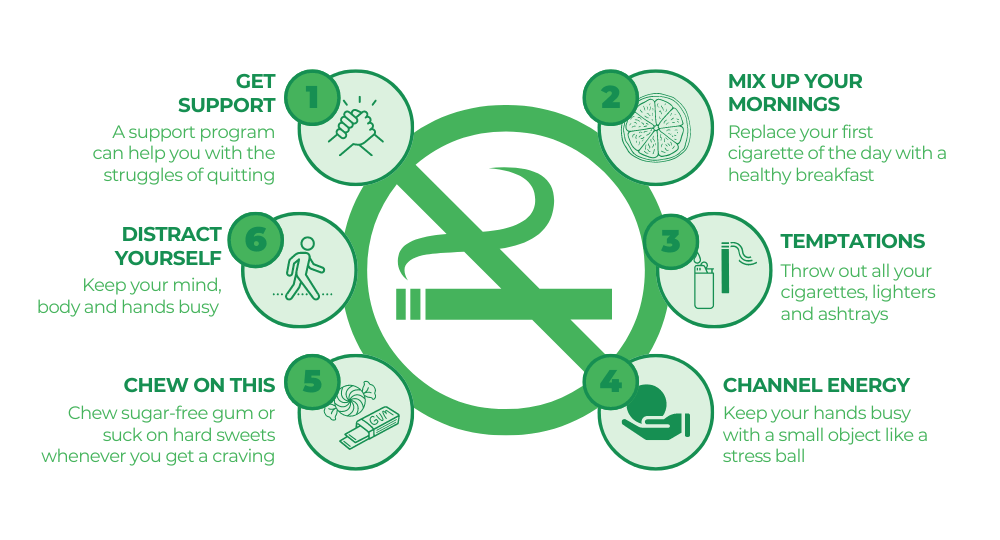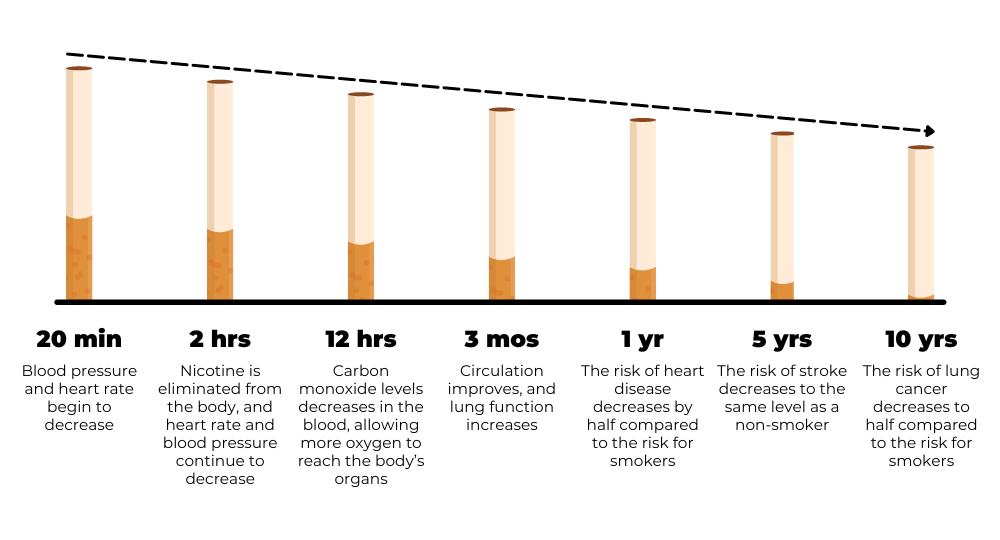Quitting Smoking: 10 Ways to Resist Tobacco Cravings
Table of Contents
Quitting smoking is a challenging but incredibly rewarding journey. Tobacco cravings can be powerful, but with the right strategies, you can resist them and achieve your goal of becoming smoke-free. Here are 10 effective ways to resist tobacco cravings and tips to help you succeed.
Distract yourself
Engage in activities that keep your mind off smoking. Try reading a book, taking a walk, or starting a new hobby. Keeping busy can help you get through the urge to smoking.
Remind yourself why you quit
Keep a list of the reasons you decided to quit smoking. Refer to this list whenever you feel a craving. Reminding yourself of the health benefits, financial savings, and positive impact on your loved ones can strengthen your resolve.
Get out of a tempting situation
Avoid places and situations where you might be tempted to smoke. If you’re in a setting where others are smoking, leave if you can.
Reward yourself
Celebrate your milestones. Set small goals and reward yourself for achieving them. Treat yourself to something you enjoy, like a nice meal, a movie, or a new book.
Find an oral substitute
Keep your mouth busy to fight cravings. Chew sugar-free gum, suck on hard sweets, or snack on healthy options like carrot sticks or nuts.
Keep your mind busy
Engage in activities that require concentration. Puzzles, games, or even work tasks can help take your mind off smoking.
Keep your hands busy
Many smokers miss the physical habit of holding a cigarette. Keep your hands occupied with stress balls, fidget spinners, or even knitting.
Brush your teeth
Brushing your teeth can reduce the urge to smoke by leaving a fresh, clean feeling in your mouth. This simple act can help you resist the temptation.
Drink water
Drinking water can help flush out toxins from your body and keep you hydrated. It also provides a simple distraction and can help manage hunger that might be mistaken for cravings.
Get active
Physical activity can help reduce cravings and withdrawal symptoms. Exercise releases endorphins, which improve your mood and help you feel better overall. Even a short walk can make a big difference.

Why is quitting so hard?
Nicotine addiction makes quitting smoking difficult. Nicotine changes brain chemistry, creating dependency. Withdrawal symptoms and the habit of smoking also contribute to the challenge. However, understanding these factors can help you prepare and succeed.
Your stop smoking plan
Creating a personalised quit plan can increase your chances of success. Start by asking yourself these questions:
- Why do I want to quit?
- What are my triggers?
- How will I handle withdrawal symptoms?
Stop smoking with START
Use the START method to structure your plan:
S = Set a quit date.
Choose a date within the next two weeks to quit.
T = Tell family, friends, and co-workers that you plan to quit.
Support from others can help you stay motivated.
A = Anticipate and plan for the challenges you’ll face while quitting.
Identify triggers and prepare coping strategies.
R = Remove cigarettes and other tobacco products from your home, car, and work.
Eliminate temptations from your environment.
T = Talk to your doctor about getting help to quit.
Your doctor can provide resources and medications to assist you.
Identify your smoking triggers
Keeping a craving journal can help you identify and manage triggers. Record:
- What time was it?
- How intense was the craving (on a scale of 1-10)?
- What were you doing?
- Who were you with?
- How were you feeling?
- How did you feel after smoking?
Do you smoke to relieve unpleasant feelings?
Smoking often masks negative emotions. Recognising these feelings and finding healthier ways to cope can help you avoid turning to cigarettes.
Tips for avoiding common triggers
- Alcohol: Limit your intake or avoid drinking in the early stages of quitting.
- Other smokers: Spend time with non-smokers and ask smoking friends not to smoke around you.
- End of a meal: Try changing your routine after meals, such as going for a walk or brushing your teeth.
Coping with nicotine withdrawal symptoms
Common nicotine withdrawal symptoms include:
- Cigarette cravings
- Irritability, frustration, or anger
- Anxiety or nervousness
- Difficulty concentrating
- Restlessness
- Increased appetite
- Headaches
- Insomnia
- Tremors
- Increased coughing
- Fatigue
- Constipation or upset stomach
- Depression
- Decreased heart rate
Manage cigarette cravings
- Distract yourself: Engage in an activity that keeps your mind off smoking.
- Remind yourself why you quit: Reflect on the benefits of being smoke-free.
- Get out of a tempting situation: Change your environment if you feel tempted.
- Reward yourself: Celebrate your progress with rewards.

Coping with cigarette cravings in the moment
- Find an oral substitute: Chew gum or eat healthy snacks.
- Keep your mind busy: Solve puzzles or read a book.
- Keep your hands busy: Use stress balls or fidget toys.
- Brush your teeth: Enjoy a clean mouth feeling.
- Drink water: Stay hydrated and distract yourself.
- Light something else: Light a candle instead of a cigarette.
- Get active: Go for a walk or exercise.
- Try to relax: Practice deep breathing or meditation.
Preventing weight gain after you stop smoking
Weight gain is a common concern when quitting. Here’s how to manage it:
- Nurture yourself: Focus on self-care and positive activities.
- Eat healthy, varied meals: Opt for nutritious foods.
- Learn to eat mindfully: Pay attention to your hunger and fullness cues.
- Drink lots of water: Stay hydrated and feel fuller.
- Take a walk: Physical activity can help control weight.
- Snack on guilt-free foods: Choose healthy snacks like fruits and vegetables.
Medication and therapy to help you quit
Various medications and therapies can aid in quitting:
- Nicotine Replacement Therapy (NRT): Patches, gum, lozenges, inhalers, and nasal sprays.
- Prescription medications: Varenicline (Champix) and bupropion (Zyban).
- Behavioural therapy: Counselling and support groups provide valuable support.
Hard facts about smoking
- Cognitive decline typically happens naturally as you get older. You may become more forgetful or not be able to think as quickly as you did when you were younger. But if you smoke, you may experience faster cognitive decline than nonsmokers.
- Smokers also have an increased risk of dementia, a condition that can affect memory, thinking abilities, language skills, judgement, and behavior. It may also cause personality changes.
- The longer you smoke, the higher your risk of greater age-related brain volume loss.
- Researchers found that smoking negatively affected the structural integrity of subcortical brain regions. They also found that smokers, compared to nonsmokers, had greater amounts of age-related brain volume loss in several areas of the brain.
- Smokers are more likely to suffer from a stroke than nonsmokers. According to the CDCTrusted Source, smoking increases the risk of a stroke by two to four times in both men and women. This risk increases if you smoke a higher number of cigarettes.
The good news is that within 5 years of quitting, your risk may decrease to that of a nonsmoker.
- Smoking introduces many toxic chemicals into the brain and body, some of which can cause cancer.
- Although research on e-cigarettes is limited, we know so far that they can have a negative impact on your brain and overall health.
Stop smoking treatments
Smoking is undoubtedly detrimental to your health. However, using our treatments is three times more effective in helping you quit smoking than trying to quit alone. Moreover, the benefits of quitting smoking are vast, including easier breathing, increased energy levels, decreased stress, and even improved sexual function. We’re here to support you in quitting smoking today.
What is the most successful way to stop smoking
A combination of medication and counselling will both help, however, you can use a combination of the following to increase your success:
- List your reasons to quit
- Tell people you are quitting
- If you have tried to quit before, remember what worked
- Use stop-smoking medications
- Have a plan if you are tempted to smoke
- List your smoking triggers and how to avoid them
- Keep cravings at bay by keeping busy
- Exercise the urge away
What happens to your body when you quit smoking?
- Within six hours, your heart rate will slow, and your blood pressure will become more stable.
- Within one day, your bloodstream will be almost nicotine-free, the level of carbon monoxide in your blood will have dropped, and oxygen will be reaching your heart and muscles more easily.
- Within one week your sense of taste and smell may have improved.
- Within three months you will be coughing and wheezing less, your immune function and circulation to your hands and feet will be improving and your lungs will be getting better at removing mucus, tar and dust.
- Within six months, your stress level is likely to have dropped, and you are less likely to be coughing up phlegm.
- After one year your lungs will be healthier and breathing will be easier than if you’d kept smoking.
- Within two to five years your risk of heart disease will have dropped significantly and will continue to do so over time.
- Within five years, a woman’s risk of cervical cancer will be the same as if you had never smoked.
- After 10 to 15 years your risk of lung cancer will be half that of someone of a similar age who keeps smoking.
- After 20 years your risk of heart attack and stroke will be similar to that of someone who has never smoked.
What happens if you suddenly stop smoking?
Can lungs heal after 40 years of smoking?
As you progress, you will experience numerous advantages from quitting smoking, such as improved lung capacity. When you stop smoking, inactive lung cells will begin to substitute the damaged cells that line your airways. This results in gradual healing and rejuvenation of your lungs, along with a reduced risk of lung cancer.


